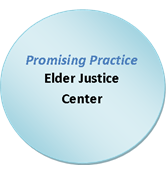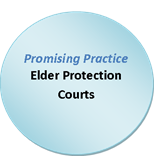Creating Multi-Agency Responses
Courts have extensive experience in applying problem-solving principles in cases that can involve multiple and interrelated issues (e.g., drug courts, mental health courts, domestic violence courts and family courts). Problem-solving principles are similarly appropriate for addressing the complexities of cases involving older persons and the challenges associated with providing effective remedies and resolutions in a timely manner. The National Center for State Courts offers a Problem-Solving Toolkit that outlines problem-solving court approaches and the steps necessary to successfully develop such a program. Rothman and Dunlop review the experiences of several jurisdictions in engaging in multi-agency collaboration in Judicial Responses to an Aging America (Court Review). The key to developing elder-friendly programs is the use of specialized staff and/or case managers to create linkages between clients, courts, and local service providers. See Interagency Coordination in the Elder Abuse section and Court Guide to Effective Collaboration on Elder Abuse under Toolkits.
Several courts, in partnership with local agencies and governments, have created innovative programs to provide assistance for older persons. Examples of innovative strategies include Elder Justice Centers (EJCs) and Elder Protection Courts. The general mission of these programs is to remove barriers to the court system and to enhance linkages between elders, courts, and service providers. Variations of these models can be incorporated into existing court programs and can be adapted to meet the needs of the local community.
Elder Justice Centers

13th Circuit Court's Elder Justice Center
In Tampa, Florida, the Florida State Courts System and Hillsborough County collaborate to fund the Elder Justice Center, which serves persons over the age of 60.
The EJC provides five primary functions:
- A designated facility to respond to the needs of the seniors in the community, including information and referrals. The facility's services can include assisting with communication devices, providing a library of brochures on available services in the surrounding community, and providing wheelchairs for use as the courthouse.
- Public education to the elderly and those who work with them. Topics can include telemarketing and consumer fraud, elder abuse, identity theft, family guardianship, and professional guardian continuing education.
- Coordination with existing agencies, such as legal services, law enforcement, and long term care facilities, that presently provide services to seniors and provide case management services as needed.
- Case management services to victims of abuse, neglect, or exploitation, including victim advocacy in criminal cases, victim services for domestic violence injunctions, and case coordination when an elder is involved in multiple cases or divisions.
- Case management and monitoring services, including the review of all initial guardianship reports, the review of all annual guardianship reports, the review of guardian fee petitions, and court monitoring services in guardianship cases for wards of the court.
Elder Protection Courts

The concept of the Elder Protection Court originated with the Superior Court of California, Alameda County.
The program was guided by an Elder Access Committee that included judicial officers, other court divisions, agency partners, and the legal community.
The project offered the following services and resources:
- Collaboration with system partners to provide legal and social services related to elder abuse.
- Development of procedures to identify, track, investigate, manage, and refer cases involving elder abuse, and the use of a case manager.
- Improvement in access to the court and court filing procedures for older adults involved in elder abuse cases.
- Creation of a service referral system through the case manager.
The principles and practices developed in Alameda County are now being applied in other California Superior Courts, such as Ventura County.
The Ventura elder abuse court hears only criminal cases designated by California Penal Code 368, which offers "special consideration and protection" for elders and dependent adults. The District Attorney's Office identifies eligible cases, which are heard by a designated judge in a courtroom that has a separate observation room for vulnerable witnesses and victims. Collaboration between courts, prosecutors, public defenders, legal aid, and local service providers makes it possible for the court to identify and focus on "368" cases.
